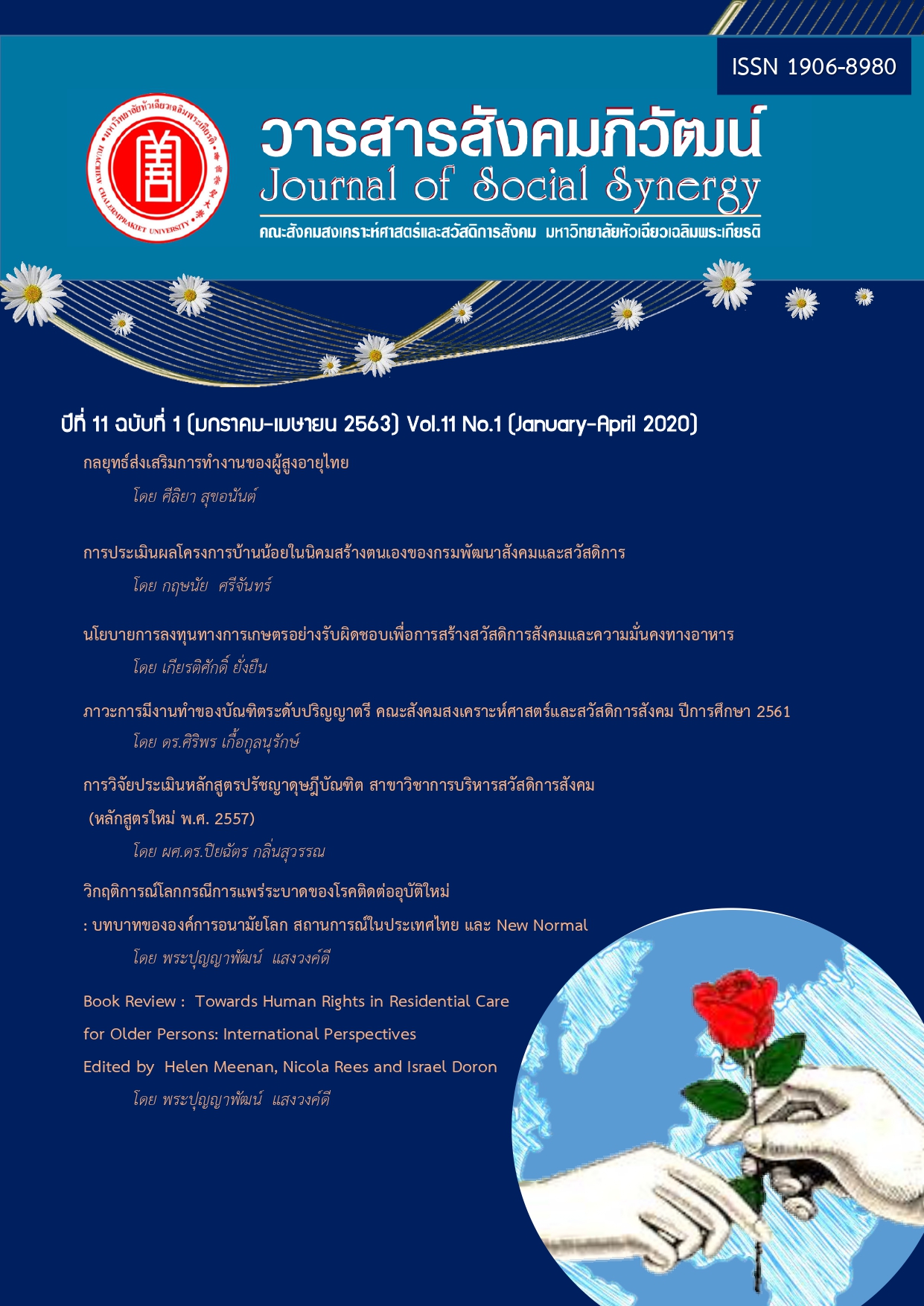กลยุทธ์ส่งเสริมการทำงานของผู้สูงอายุไทย
คำสำคัญ:
กลยุทธ์, การส่งเสริมการทำงาน, ผู้สูงอายุไทย, ทัศนคติเกี่ยวกับการทำงาน, ความต้องการในการทำงานบทคัดย่อ
โครงการวิจัยกลยุทธ์ส่งเสริมการทำงานของผู้สูงอายุไทย มีวัตถุประสงค์เพื่อศึกษาสถานการณ์การทำงานและลักษณะการทำงานของผู้ใหญ่และผู้สูงอายุไทยในปัจจุบัน เพื่อศึกษาทัศนคติและความต้องการการสนับสนุนด้านการทำงานของผู้ใหญ่และผู้สูงอายุไทย รวมทั้งเพื่อกำหนดกลยุทธ์ในการส่งเสริมการทำงานของผู้ใหญ่และผู้สูงอายุไทย โดยมีเป้าหมายสำคัญคือส่งเสริมให้ผู้ใหญ่และผู้สูงอายุมีงานทำเพื่อการพึ่งพาตนเองได้อย่างต่อเนื่องและยั่งยืน
โครงการวิจัยชิ้นนี้ใช้วิธีการวิจัยแบบผสานวิธี ซึ่งประกอบด้วย การวิจัยเชิงเอกสาร การวิจัยเชิงปริมาณ และการวิจัยเชิงคุณภาพที่มีการใช้ทั้งวิธีการสนทนากลุ่ม และการสัมภาษณ์เชิงลึก สำหรับการวิจัยเชิงปริมาณ กลุ่มตัวอย่างในการวิจัย คือ ผู้ใหญ่และผู้สูงอายุที่มีอายุระหว่าง 55 – 65 ปี โดยเป็นแรงงานนอกระบบหรือผู้ที่ว่างงาน ใช้แบบสอบถามเป็นเครื่องมือในการวิจัย ส่วนการสนทนากลุ่ม กลุ่มเป้าหมายคือ ตัวแทนของหน่วยงานที่มีส่วนเกี่ยวข้องกับการส่งเสริมการทำงานของผู้ใหญ่และผู้สูงอายุในพื้นที่ เช่น สำนักงานพัฒนาสังคมและความมั่นคงของมนุษย์จังหวัด (พมจ.) แรงงานจังหวัด ตัวแทนจากองค์กรปกครองส่วนท้องถิ่น และสมาชิกชมรม/สมาคมผู้สูงอายุ สำหรับการสัมภาษณ์เชิงลึกเป็นการสัมภาษณ์ผู้เชี่ยวชาญเกี่ยวกับด้านแรงงานและผู้สูงอายุซึ่งเป็นผู้เชี่ยวชาญและนักวิชาการจากสถาบันการศึกษา/หน่วยงานต่างๆ
ผลการวิจัย พบว่า สถานการณ์การทำงานของผู้สูงอายุในปัจจุบันมีแนวโน้มเพิ่มสูงขึ้นอย่างต่อเนื่อง และส่วนใหญ่เป็นแรงงานนอกระบบที่จบการศึกษาในระดับประถมศึกษาหรือต่ำกว่า อาชีพส่วนใหญ่เป็นอาชีพเกษตรกรรม รับจ้าง ค้าขาย ซึ่งเป็นอาชีพที่ไม่มั่นคงและมีรายได้ไม่แน่นอน เป็นการทำงานโดยไม่มีทักษะและสมรรถนะอย่างเพียงพอ ส่งผลให้ผู้สูงอายุที่ยากจนมีจำนวนค่อนข้างมาก เหตุผลสำคัญในการทำงานอย่างต่อเนื่องของกลุ่มตัวอย่างคือ การมีภาระที่ต้องดูแลบุคคลในครอบครัว มีรายได้ไม่เพียงพอต่อค่าใช้จ่ายในครอบครัว และต้องการใช้เงินเลี้ยงดูตนเอง ซึ่งเป็นเหตุผลในเชิงเศรษฐกิจเป็นหลัก แหล่งรายได้หลักส่วนใหญ่มาจากการทำงาน รองลงมาคือ เบี้ยยังชีพผู้สูงอายุ บุตร และคู่สมรส กลุ่มตัวอย่างส่วนใหญ่มีระดับคะแนนของทัศนคติในเชิงบวกต่อการทำงานของผู้สูงอายุ โดยเฉพาะทัศนคติด้านเศรษฐกิจและการทำงาน และเมื่อเปรียบเทียบปัจจัยต่างๆ ที่เกี่ยวข้อง พบว่า ผู้สูงอายุ (60 – 65 ปี) มีระดับคะแนนของทัศนคติที่สูงกว่าผู้ใหญ่ (55 – 59 ปี) ผู้ที่ยังคงทำงานอยู่ในปัจจุบันและเคยมีประสบการณ์ทำงานเมื่อ 5 ปีที่แล้วมีระดับคะแนนของทัศนคติมากกว่าผู้ที่ไม่ได้ทำงานและผู้ที่ไม่มีประสบการณ์เช่นกัน ส่วนความต้องการการสนับสนุนการทำงาน พบว่า กลุ่มตัวอย่างส่วนใหญ่ต้องการสวัสดิการด้านการรักษาพยาบาล รองลงมาคือสวัสดิการและความมั่นคงด้านรายได้และการประกอบอาชีพ อันดับสามคือการปรับปรุงสภาพแวดล้อมให้เหมาะสมกับการทำงาน
ข้อมูลจากการวิจัยเชิงปริมาณทำให้สามารถจำแนกกลุ่มตัวอย่างได้เป็น 3 กลุ่มคือ กลุ่มที่ทำงานอยู่ในปัจจุบัน และต้องการทำงานต่อเนื่อง กลุ่มที่ปัจจุบันทำงาน แต่ต่อไปไม่ต้องการทำงาน และกลุ่มที่ไม่ได้ทำงาน แต่อนาคตต้องการที่จะทำงาน จากการศึกษาในเชิงคุณภาพทำให้ทราบถึงเหตุผลของความต้องการทำงานในแต่ละกลุ่ม โดยกลุ่มแรกมีความจำเป็นในด้านเศรษฐกิจเป็นหลัก และมีความพร้อมด้านสุขภาพ กลุ่มที่สองส่วนใหญ่มีปัญหาด้านสุขภาพ และครอบครัวไม่ต้องการให้ทำงาน ส่วนกลุ่มที่สามมีความจำเป็นที่จะต้องทำงานเนื่องจากมีภาระในครอบครัวมากขึ้น หรือถูกทอดทิ้งให้อยู่ตามลำพัง ประเภทของงานที่เหมาะสมได้แก่ งานที่ไม่เน้นการใช้สมรรถนะหรือกำลังแรงงาน รวมทั้งงานที่มีความยืดหยุ่นในด้านของเวลา และสถานที่ ส่วนปัจจัยหนุนเสริมในการทำงานได้แก่ ผู้สูงอายุที่มีทักษะ/ประสบการณ์ และสามารถเรียนรู้การทำงานใหม่ๆ ที่ไม่เกินความสามารถได้ ภาครัฐที่มีนโยบายเอื้อต่อการทำงาน และการมีส่วนร่วมของภาคส่วนต่างๆ ปัจจัยที่เป็นอุปสรรค ได้แก่ ผู้สูงอายุที่มีปัญหาด้านสุขภาพ การขาดฐานข้อมูลด้านผู้สูงอายุ ผลิตภัณฑ์จากผู้สูงอายุยังไม่สอดคล้องกับความต้องการของตลาด และการบูรณาการระหว่างหน่วยงานขาดความเป็นเอกภาพ
ในส่วนของการสัมภาษณ์เชิงลึกผู้เชี่ยวชาญ/นักวิชาการ ในประเด็นเกี่ยวกับการส่งเสริมการทำงานของผู้สูงอายุ ผู้เชี่ยวชาญ/นักวิชาการมีความเห็นที่สอดคล้องกันในด้านของการส่งเสริมเชิงคุณภาพ เช่น การพัฒนาทักษะความรู้และส่งเสริมช่องทางการตลาด แต่มีความคิดเห็นที่แตกต่างกันในด้านการส่งเสริมเชิงปริมาณ เนื่องจากแรงงานนอกระบบที่เป็นผู้ใหญ่และผู้สูงอายุสามารถกำหนดอายุการทำงานได้ด้วยตนเอง และมีจำนวนที่มากเพียงพอจึงไม่จำเป็นที่จะต้องส่งเสริมในเชิงปริมาณ แนวทางการส่งเสริมการทำงานของผู้สูงอายุที่เหมาะสมคือ การเตรียมความพร้อมในด้านสุขภาพและทักษะของผู้สูงอายุ การจัดการด้านข้อมูลและส่งเสริมการทำงานแบบบูรณาการ
ผลจากการประมวลข้อมูลทั้งหมดนำมาสู่การกำหนดกลยุทธ์ในการส่งเสริมการทำงาน 5 กลยุทธ์คือ
- จัดทำฐานข้อมูลของผู้สูงอายุและกลไกในระดับพื้นที่
- สร้างค่านิยมในการส่งเสริมการทำงานของผู้สูงอายุ
- ส่งเสริมการบูรณาการด้านการทำงานของผู้สูงอายุ
- ส่งเสริม พัฒนาอาชีพให้ครบวงจร เพื่อการขับเคลื่อนการดำเนินงานด้านผู้สูงอายุ
- พัฒนาระบบความคุ้มครองในการทำงานของผู้สูงอายุ
สำหรับข้อเสนอแนะเพิ่มเติมเพื่อการพัฒนางานได้แก่ การเตรียมความพร้อมเพื่อสร้างหลักประกันและความมั่นคงด้านการเงินโดยเริ่มต้นตั้งแต่วัยแรงงาน การส่งเสริมให้ผู้ที่ทำงานในระบบมีการทำอาชีพเสริมเพื่อเพิ่มรายได้ควบคู่กันไป เพื่อให้มีทักษะและประสบการณ์ที่ทำให้สามารถทำงานได้อย่างต่อเนื่อง และควรมีการนำกลยุทธ์ที่กำหนดไปทดลองปฏิบัติในพื้นที่ค่อนข้างจะมีความพร้อม ก่อนที่จะมีการขยายผลไปยังพื้นที่อื่นๆ
เอกสารอ้างอิง
กรมกิจการผู้สูงอายุ, กระทรวงการพัฒนาสังคมและความมั่นคงของมนุษย์. (2552). แผนพัฒนาผู้สูงอายุแห่งชาติ ฉบับที่ 2 (พ.ศ. 2545 - 2564) (แก้ไขเพิ่มเติม ฉบับที่ 2). กรุงเทพฯ: โรงพิมพ์เทพเพ็ญวานิสย์.
กุศล สุนทรธาดา และคณะ. (2554, สิงหาคม). การศึกษาเพื่อหารูปแบบการส่งเสริมการมีงานทำแก่ผู้สูงอายุในพื้นที่ชนบท. ใน สำนักงานปลัดกระทรวงแรงงาน (ประธาน), โครงการสัมมนาเครือข่ายงานวิจัยด้านแรงงาน ปี 2554. การประชุมจัดโดยสำนักงานปลัดกระทรวงแรงงาน, โรงแรมเจ้าพระยาปาร์ค.
จิราภรณ์ คำแหง. (2553). แนวทางการสร้างความมั่นคงทางเศรษฐกิจให้กับผู้สูงอายุขององค์การบริหารส่วนตำบลโพนบก. (รายงานการวิจัย). กรุงเทพฯ: มหาวิทยาลัยรามคำแหง.
มูลนิธิสถาบันวิจัยและพัฒนาผู้สูงอายุไทย. (2559). สถานการณ์ผู้สูงอายุไทยประจำปี 2559. กรุงเทพฯ: พริ้นเทอรี่.
ศศิพัฒน์ ยอดเพชร. (2558). พัฒนาการวัยผู้ใหญ่และผู้สูงอายุ. (พิมพ์ครั้งที่ 1) นนทบุรี: สำนักพิมพ์มหาวิทยาลัย สุโขทัยธรรมาธิราช.
Freeman, J.L.,et. Al.(2015).ทัศนคติและความพึงพอใจในการทำงาน. สืบค้นเมื่อวันที่ 13 มิถุนายน 2562, จากhttps://www.novabizz.com/NovaAce/Manage/satisfaction.htm
ดาวน์โหลด
เผยแพร่แล้ว
รูปแบบการอ้างอิง
ฉบับ
ประเภทบทความ
สัญญาอนุญาต
บทความที่ได้รับการตีพิมพ์เป็นลิขสิทธิ์ของวารสารสังคมภิวัฒน์ มหาวิทยาลัยหัวเฉียวเฉลิมพระเกียรติ
ข้อความที่ปรากฏในบทความแต่ละเรื่องในวารสารวิชาการเล่มนี้เป็นความคิดเห็นส่วนตัวของผู้เขียนแต่ละท่านไม่เกี่ยวข้องกับมหาวิทยาลัยหัวเฉียวเฉลิมพระเกียรติ และคณาจารย์ท่านอื่นๆในมหาวิทยาลัยฯ แต่อย่างใด ความรับผิดชอบองค์ประกอบทั้งหมดของบทความแต่ละเรื่องเป็นของผู้เขียนแต่ละท่าน หากมีความผิดพลาดใดๆ ผู้เขียนแต่ละท่านจะรับผิดชอบบทความของตนเองแต่ผู้เดียว




